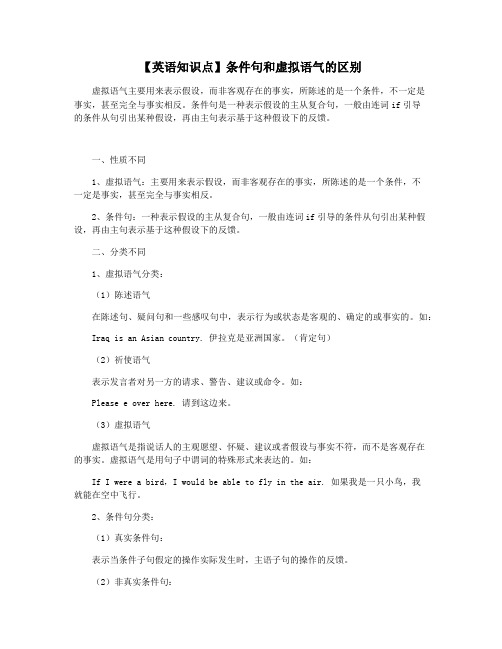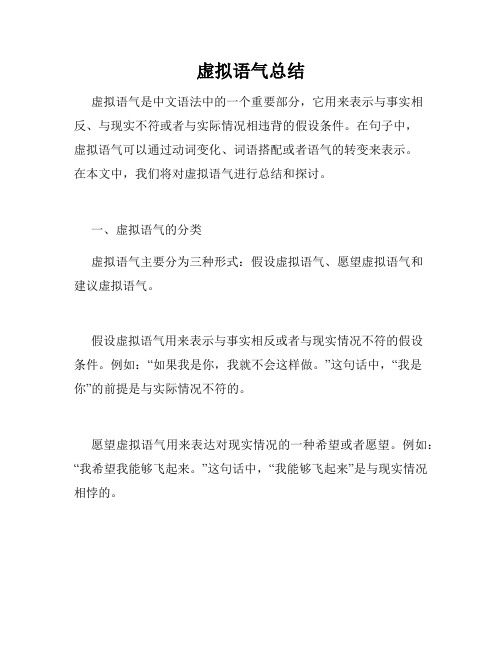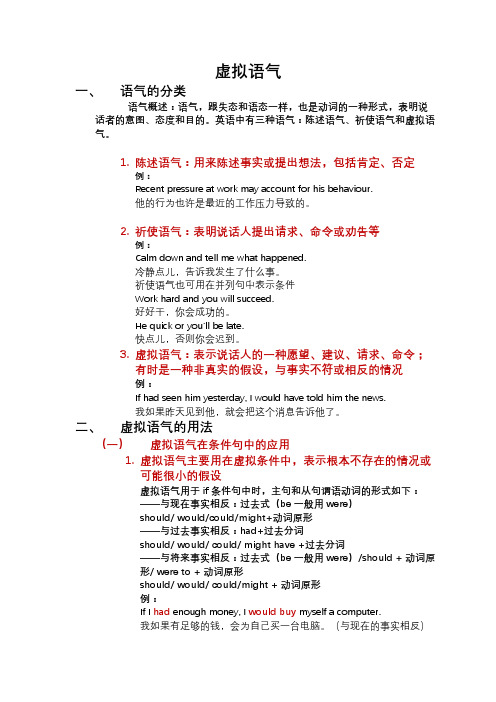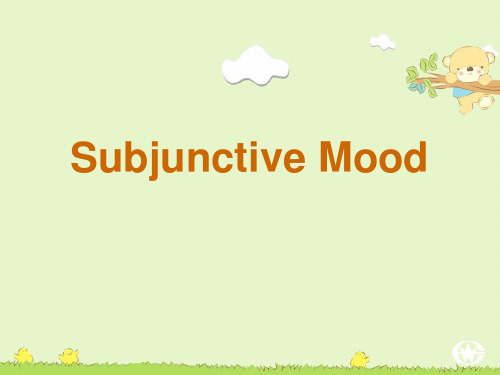虚拟语气分类
高考英语 虚拟语气完整分类与讲解

虚拟语气第一部分:语气的定义和种类1 语气(mood)语气是动词的一种形式,表示说话人对某一行为或事情的看法和态度。
2 语气的种类⑴、陈述语气:表示动作或状态是现实的、确定的或符合事实的,用于陈述句、疑问句和某些感叹句。
如:①There are two sides to every question.每个问题都有两个方面。
②Were you busy all day yesterday?昨天一整天你都很忙吗?③How good a teacher she is!她是多好的一位老师啊!⑵、祈使语气:表示说话人对对方的请求或命令。
如:①Never be late again!再也不要迟到了。
②Don’t forget to turn off the light.别忘了关灯。
⑶、虚拟语气:表示动作或状态不是客观存在的事实,而是说话人的主观愿望、假设或推测等。
如:①If I were a bird, I could fly in the air.如果我是一只小鸟,我就能在空中飞行。
②I wish I could pass the examination.我希望我能通过考试。
③May you succeed!祝您成功!虚拟语气在语法里算得上是个难点。
让我们就从最简单的开始吧。
第二部分:简单句中的虚拟语气一、情态动词的过去式用于现在时态时,表示说话人的谦虚、客气、有礼貌、或委婉的语气,常用于日常会话中。
如:⑴.Would you be kind enough to show me the way to the post office?请你告诉我去邮局的路好吗?⑵.It would be better for you not to stay up too late.你最好别熬夜到很晚。
二、表祝愿。
1、常用“may+动词原形”表示祝愿,但愿,此时may须置于句首(多用于正式文体中)。
⑴、May good luck be yours!祝你好运!⑵、May you be happy!祝你快乐!⑶、May you do even better!祝你取得更大成就!⑷、May you have a good time. 祝愿你玩的痛快。
英语虚拟语气构成形式

英语虚拟语气构成形式一、虚拟语气的定义虚拟语气是一种表示假设或主观愿望的语气,它表达了与实际情况相反的条件或情境。
在英语中,虚拟语气常常用于表达假设、条件、愿望或建议等。
二、虚拟语气的分类虚拟语气可以分为两类:现在虚拟语气和过去虚拟语气。
1.现在虚拟语气:表示与现在实际情况相反的假设或条件。
2.过去虚拟语气:表示与过去实际情况相反的假设或条件。
三、虚拟语气的构成形式1.现在虚拟语气的基本构成形式:(1)动词原形+would/should/could/might+动词原形。
例如:If I had time now,I would read the book. (2)were+主语+动词原形。
例如:If I were you,I would go to the party. (3)助动词did+主语+动词原形。
例如:If you did your homework,you would pass the exam.2.3.过去虚拟语气的基本构成形式:(1)had+过去分词+would/should/could/might+have+过去分词。
例如:If we had left earlier,we would have caught the train. (2)had+过去分词+助动词had+过去分词。
例如:If he had known your telephone number,he wouldhave called you. (3)助动词did+主语+动词原形+if+主语+had+过去分词。
例如:If we had known the truth,we would not have come here.4.四、虚拟语气的用法虚拟语气常常用于表达假设、条件、愿望或建议等,具体用法如下:1.表示假设:虚拟语气可以表示与实际情况相反的假设或条件,表达了说话者对某种情况的主观愿望或推测。
2.表示建议:虚拟语气可以表示建议或请求,表达了说话者对某种行为的建议或请求。
英语虚拟语气笔记整理

英语虚拟语气笔记整理英语中的虚拟语气是表示现在、过去和将来的语气形式,它可以帮助我们在写作中表达不同的意思。
本文通过虚拟语气的记忆来整理并深入解释英语中的虚拟语气,以便让读者比较容易地理解和使用虚拟语气。
什么是虚拟语气?虚拟语气是指发出某种愿望或假设的语气,它不需要任何实际的发生情况,只是表示一种假设或非实际的情况。
因此,虚拟语气的使用可以表达某种愿望、假设、意志等不同的含义。
虚拟语气的分类英语中的虚拟语气可以分为三种类型:现在虚拟语气、过去虚拟语气和将来虚拟语气。
一、现在虚拟语气现在虚拟语气是指表达可能发生或不可能发生的情况,其基本结构为“if + were/had +去分词”或“should +词原形”。
例句:If I were you, I would study harder.Should you have any questions, please do not hesitate to contact me.二、过去虚拟语气过去虚拟语气是指表达已经发生或未发生的情况,其基本结构为“if + had +去分词”。
例句:If I had taken his advice, I wouldn be in such a mess now. If he had arrived earlier,he wouldn have missed the meeting.三、将来虚拟语气将来虚拟语气是指表达将来发生的情况,其基本结构为“if + were/had +去分词”。
例句:If I were/had been there, I would have helped him.If she were/had been able to come, she would have joined us.虚拟语气的使用虚拟语气在英语中有很多用法,其中最常用的是表达建议、主张和要求等。
1.示建议虚拟语气可以用来表达建议,其结构为“should +词原形”。
【英语知识点】条件句和虚拟语气的区别

【英语知识点】条件句和虚拟语气的区别虚拟语气主要用来表示假设,而非客观存在的事实,所陈述的是一个条件,不一定是事实,甚至完全与事实相反。
条件句是一种表示假设的主从复合句,一般由连词if引导的条件从句引出某种假设,再由主句表示基于这种假设下的反馈。
一、性质不同1、虚拟语气:主要用来表示假设,而非客观存在的事实,所陈述的是一个条件,不一定是事实,甚至完全与事实相反。
2、条件句:一种表示假设的主从复合句,一般由连词if引导的条件从句引出某种假设,再由主句表示基于这种假设下的反馈。
二、分类不同1、虚拟语气分类:(1)陈述语气在陈述句、疑问句和一些感叹句中,表示行为或状态是客观的、确定的或事实的。
如:Iraq is an Asian country. 伊拉克是亚洲国家。
(肯定句)(2)祈使语气表示发言者对另一方的请求、警告、建议或命令。
如:Please e over here. 请到这边来。
(3)虚拟语气虚拟语气是指说话人的主观愿望、怀疑、建议或者假设与事实不符,而不是客观存在的事实。
虚拟语气是用句子中谓词的特殊形式来表达的。
如:If I were a bird,I would be able to fly in the air. 如果我是一只小鸟,我就能在空中飞行。
2、条件句分类:(1)真实条件句:表示当条件子句假定的操作实际发生时,主语子句的操作的反馈。
(2)非真实条件句:这意味着,当条件条款假定的行为不是客观发生的,而是主观虚构的,主句动作的反馈。
[所谓的与事实相反]。
感谢您的阅读,祝您生活愉快。
高考英语虚拟语气

高考英语虚拟语气在英语中,虚拟语气是一种用来表达假设、想象、期望或建议的语言形式。
虚拟语气可以用来表达我们对于某些事情的看法或观点,而这些事情可能并不是真实的。
在高考英语中,虚拟语气是一个重要的语法点,需要考生们熟练掌握并运用。
一、虚拟语气的分类虚拟语气可以分为两类:现在虚拟语气和过去虚拟语气。
现在虚拟语气用于表达对于现在或未来的假设,而过去虚拟语气则用于表达对于过去的假设。
二、虚拟语气的构成虚拟语气的构成主要是通过谓语动词的变化来实现的。
在现在虚拟语气中,常用的谓语动词包括“would”、“could”、“should”、“might”等;在过去虚拟语气中,常用的谓语动词包括“would have done”、“could have done”、“should have done”、“might have done”等。
三、虚拟语气的使用场合虚拟语气通常用于表达主观的看法或建议,如表达对某件事情的遗憾、不满或期望。
在高考英语中,虚拟语气常常出现在完形填空、阅读理解、语法填空和写作等题型中。
四、虚拟语气的解题技巧1、理解语境:在理解题目语境的基础上,判断应该使用现在虚拟语气还是过去虚拟语气。
2、分析谓语动词:根据谓语动词的变化形式,判断应该使用哪个虚拟语气的形式。
3、关键词:在题目中寻找相关的关键词,如“如果”、“要是我”、“要是能”等,这些关键词通常会提示考生需要使用虚拟语气。
4、排除干扰项:在解题时,要排除那些与虚拟语气无关的选项,以免被干扰。
虚拟语气是高考英语中的一个重要考点,考生们需要熟练掌握其构成和用法。
只有在实际运用中多加练习,才能更好地理解和掌握这一语法点。
高考英语虚拟语气在英语中,虚拟语气是一种用来表达假设、想象、期望或建议的语言形式。
虚拟语气可以用来表达我们对于某些事情的看法或观点,而这些事情可能并不是真实的。
在高考英语中,虚拟语气是一个重要的语法点,需要考生们熟练掌握并运用。
虚拟语气总结

虚拟语气总结虚拟语气是中文语法中的一个重要部分,它用来表示与事实相反、与现实不符或者与实际情况相违背的假设条件。
在句子中,虚拟语气可以通过动词变化、词语搭配或者语气的转变来表示。
在本文中,我们将对虚拟语气进行总结和探讨。
一、虚拟语气的分类虚拟语气主要分为三种形式:假设虚拟语气、愿望虚拟语气和建议虚拟语气。
假设虚拟语气用来表示与事实相反或者与现实情况不符的假设条件。
例如:“如果我是你,我就不会这样做。
”这句话中,“我是你”的前提是与实际情况不符的。
愿望虚拟语气用来表达对现实情况的一种希望或者愿望。
例如:“我希望我能够飞起来。
”这句话中,“我能够飞起来”是与现实情况相悖的。
建议虚拟语气用来表示一种建议或者命令的语气。
例如:“你最好不要再迟到了。
”这句话中,“你最好不要迟到”是一种与现实情况相反的建议。
二、虚拟语气的用法虚拟语气的用法在语法中有一定的规则。
在假设虚拟语气中,如果条件是与现实相反的假设,一般用“如果”、“要是”、“虽然”等连词引导。
在愿望虚拟语气中,可以使用“但愿”、“要是”、“如果”等词语来引导。
在建议虚拟语气中,常用的引导词有“最好”、“最宜”、“要是”等。
虚拟语气的主要表示方式是通过动词的变化。
在汉语中,动词的变化包括假定语气动词的使用、词语搭配的改变和语气的转换。
例如,在假设虚拟语气中,“是”可以变为“要是”、“如果”、“虽然”等;在愿望虚拟语气中,动词可以添加“了”、“吧”等语气词来表示虚拟语气。
有一些常用的虚拟语气的表达方式。
例如,在假设虚拟语气中,可以用“要是”+现在时态表示现在虚拟,用“要是”+过去时态表示过去虚拟。
在愿望虚拟语气中,可以用“但愿”+现在时态表示对现在情况的一种希望,用“但愿”+过去时态表示对过去情况的一种希望。
在建议虚拟语气中,可以用“要是”+现在时态表示对现在情况的一种建议或者命令。
三、虚拟语气的意义和作用虚拟语气在语言交际中有着重要的意义和作用。
它可以用来表示一种假设条件或者与事实相反的情况,让语言变得更加丰富和灵活。
英语语法:虚拟语气归纳整理

虚拟语气一、语气的分类语气概述:语气,跟失态和语态一样,也是动词的一种形式,表明说话者的意图、态度和目的。
英语中有三种语气:陈述语气、祈使语气和虚拟语气。
1.陈述语气:用来陈述事实或提出想法,包括肯定、否定例:Recent pressure at work may account for his behaviour.他的行为也许是最近的工作压力导致的。
2.祈使语气:表明说话人提出请求、命令或劝告等例:Calm down and tell me what happened.冷静点儿,告诉我发生了什么事。
祈使语气也可用在并列句中表示条件Work hard and you will succeed.好好干,你会成功的。
H e quick or you’ll be late.快点儿,否则你会迟到。
3.虚拟语气:表示说话人的一种愿望、建议、请求、命令;有时是一种非真实的假设,与事实不符或相反的情况例:If had seen him yesterday, I would have told him the news.我如果昨天见到他,就会把这个消息告诉他了。
二、虚拟语气的用法(一)虚拟语气在条件句中的应用1.虚拟语气主要用在虚拟条件中,表示根本不存在的情况或可能很小的假设虚拟语气用于if条件句中时,主句和从句谓语动词的形式如下:——与现在事实相反:过去式(be一般用were)should/ would/could/might+动词原形——与过去事实相反:had+过去分词should/ would/ could/ might have +过去分词——与将来事实相反:过去式(be一般用were)/should + 动词原形/ were to + 动词原形should/ would/ could/might + 动词原形例:If I had enough money, I would buy myself a computer.我如果有足够的钱,会为自己买一台电脑。
高中虚拟语气

04
虚拟语气在特定句型中应用
It is time that…句型
定义 It is time that…句型表示“现在是……的时候了”,其中 that从句中的谓语动词用过去时,有时也用“should+动 词原形”(较少见,且should不能省略)。
用法示例
It is time that we went to bed. 我们该睡觉了。或者 It is time that we should go to bed. 我们该睡觉了。
03
名词性从句中虚拟语气应用
宾语从句
wish后的宾语从句:表示与现在事实相反的愿望,从句用一般过去时;表示与过去事实相反 的愿望,从句用过去完成时;表示与将来事实相反的愿望,从句用could/would/might+动 词原形。
suggest, propose, recommend, demand, require, request, desire等动词后的宾语从句: 从句谓语由“should+动词原形”构成,其中的should在美国英语中通常可以省略。
虚拟语气在倒装句中应用
虚拟语气在倒装句中的应用主 要是指当虚拟条件句的谓语部 分含有were, had或should等词 时,可将这些词置于句首,采 用部分倒装的结构。
这种倒装结构在表达虚拟语气 时,可以使语气更加委婉、客 气或正式,常用于书面语中。
需要注意的是,在倒装结构中, 如果省略了if,则需要将were, had或should等词提至主语之 前,形成完全倒装的结构。同 时,主句中的语序和时态也需 要进行相应的调整。
和特殊用法的理解和运用还有待提高。
教师评语和建议
学生对虚拟语气的掌握情况良好
通过课堂表现和作业完成情况来看,学生对虚拟语气的掌握情况良好,能够正确运用虚拟语 气表达不同的意思。
虚拟语气大全PPT

05
虚拟语气的常见错误
时态错误
总结词
时态错误是虚拟语气中常见的错误之 一,主要表现在时态与虚拟场景不匹 配。
详细描述
在虚拟语气中,时态应与虚拟场景相 符合。例如,在表示与现在事实相反 的虚拟场景时,应使用一般过去时, 而不是一般现在时。
语气词错误
要点一
总结词
语气词错误是指在使用虚拟语气时,语气词的选择不正确 。
虚拟语气在省略句中的用法
虚拟语气在if省略句中的用法
在if省略句中,如果条件状语从句中有were、had、should等词,可以省略if,并把were、had、should等词放 在句首。
虚拟语气在倒装句中的用法
在虚拟语气中,有时需要将谓语动词提前构成倒装句,以强调语气。例如,Were it not for your help, I would not have succeeded.
答案及解析
had read
解析
此题考查虚拟语气中的“if only”结构,表示“要是…… 就好了”。根据句意,应该使用过去完成时表示与过去事 实相反的情况。因此,答案为“had read”。
翻译题练习
翻译题1
如果我是你,我就会去参加那个 聚会。
答案及解析
If I were you, I would go to the party.
06
虚拟语气练习题及解析
选择题练习
选择题1
If it were not for the fact that I _______ busy, I would go with you.
答案及解析
A. am B. were C. will be D. have been
解析
Subjunctive-Mood-虚拟语气讲解

If there were no subjueasier to learn.
• A. could have been • B. would be • C. will be • D. would have been
2.were型虚拟式常用于wish, would rather, suppose, imagine等表示“希望,但愿,宁愿”的-that 分句 中,表示一种臆想的(通常是不可能发生的)情况。
与过去 相反的 假设
If+主语+had +过去分词
主语+should,
would, might, could +have done
与将来 相反的 假设
1、If+主语+动词过去式 2、If+主语+were to+ 动词原形 3、If+主语+should +动词原形
主语+should, would might, could+动词
that _b_e__s_e_n__t_(send) to hospitals at once. 3.He suggested that we_h__a_v_e___(have) a meeting at
once.
2、用在It is +形容词 + that-clause中, 主要表 示主观看法,比如:“某事是必要的、重要的、自 然而然的” 从句谓语动词用should +动词原形, should 可省。
• It’s natural that she should do so. 她这样做是很自然的。
• It’s important that we should take good care of the patient.
英语虚拟语气

英语虚拟语气摘要:一、英语虚拟语气的概念与分类1.定义2.分类二、英语虚拟语气的用法1.表示与现在事实相反的假设2.表示与过去事实相反的假设3.表示对未来事实的虚拟4.表示愿望、建议、命令等三、虚拟语气在各种从句中的应用1.名词性从句2.状语从句3.定语从句四、虚拟语气与其他语气的区别1.与条件语气的区别2.与推测语气的区别五、虚拟语气的注意事项1.形式的变化2.语气的转换3.语境的理解正文:一、英语虚拟语气的概念与分类1.定义英语虚拟语气(Subjunctive Mood)是一种表示说话者对某个动作或情况的真实性、可能性或期望的语气。
它用于表示与事实相反的假设、愿望、建议等。
2.分类根据用途和时态,英语虚拟语气可分为三类:(1)与现在事实相反的虚拟语气,如:If I were you,I would accept the job.(2)与过去事实相反的虚拟语气,如:If he had known the truth,he would have helped me.(3)表示对未来事实的虚拟,如:If it rains tomorrow,we will stay at home.二、英语虚拟语气的用法1.表示与现在事实相反的假设虚拟语气用于表示与现在事实相反的假设,如:If I were you,I would accept the job.2.表示与过去事实相反的假设虚拟语气用于表示与过去事实相反的假设,如:If he had known the truth,he would have helped me.3.表示对未来事实的虚拟虚拟语气用于表示对未来事实的虚拟,如:If it rains tomorrow,we will stay at home.4.表示愿望、建议、命令等虚拟语气可用于表示愿望、建议、命令等,如:I wish he would come to our party.三、虚拟语气在各种从句中的应用1.名词性从句在名词性从句中,如主语从句、宾语从句和表语从句,可以使用虚拟语气,如:What if I tell you that we can succeed?2.状语从句在表示条件、原因、目的等状语从句中,可以使用虚拟语气,如:If I were you,I would accept the job.3.定语从句在定语从句中,如用虚拟语气修饰的名词性从句,如:The man who would win the competition was my brother.四、虚拟语气与其他语气的区别1.与条件语气的区别虚拟语气与条件语气都表示假设,但虚拟语气更注重对事实的虚拟,而条件语气关注条件与结果之间的关系。
虚拟语气的用法分类

虚拟语气虚拟语气是一项语法难点,为了便于理解与记忆,我们把虚拟语气分成三大块: I.名词从句中的虚拟语气标志词+should+动词原形 II .非真实条件从句中的虚拟语气种类 1. 三种基本态 2. 倒装虚拟句 3. 混时虚拟句 4. 含蓄虚拟句 5. 跳层虚拟句III .其它情形中的虚拟语气(wish/would rather/it^s high time …/if only …/as if …) I 、名词从句虚拟语气(1) ask, advise, beg, command, demand, decide, desire, insist, order, prefer, propose, require, recommend, request, suggest, urge 等表示命令、要求、建议等含义的动词后的宾语从句中,谓语动词用(should )+动词原形, eg. I suggest / suggested that we (should ) go tomorrow.名词从句虚拟语气例如: Mr. Johnson insisted that the problem worthy of attention (讨论)at the meeting, (discuss ) (10 湖北 76) 答案:(should ) be discussed(2) It is +(形容词/过去分词/特定名词)+that 的从句中,形容词主要是表示令人吃惊的、重要的、必要的、关键的等 词汇。
形容词:astonishing , amazing, advisable, appropriate, crucial, desirable, essential, important , imperative, keen, necessary , natural, normal, odd, proper, preferable, strange , sorry, shocked, surprising , urgent, unusual, vital 等。
语法错题分类(虚拟语气)

语法错题分类(虚拟语气)表示假想或主观愿望时,动词需用一种特殊形式,叫虚拟语气。
虚拟语气的类型:例句:1.I f I were to do the job, I would do it in a different way.2.I f you left your bicycle outside, someone would steal it.3.I f I lived near my office, I would walk to work.4.W ere it not for their loan, our life would be very difficult.5.S hould they come tomorrow, I would show them my new photos.例句:1.I f my father had lived, he could have done all this for me.2.I f I had left sooner, I would have caught the bus.3.I f I had been Nancy, I wouldn’t have left him.4.W hat would you have done if you’d been in my position?5.I f it hadn’t been for your timely help, we would have got into serious trouble.6.H ad I not seen it with my own eyes, I would not have believed it.7.H ad I gone/been there, I would have bought a book for you.without, otherwise, but for, if only1. Without your help, I could not have succeeded in developing this software.2. I was ill yesterday, otherwise, I would have gone to the film “ Gone With The Wind”.3. But for the heavy rain, we would have gone out to play.4. If only there were only the spring season all the year.5. If only you had come yesterday, I could have asked you for help.考点3:Wish 宾语从句(根据意思判断现在虚拟语气或过去虚拟语气)As if 后面用虚拟语气,时态根据意思而定1.I wish I had more time.2.I wish I were young again.3.I wish (that) I had listened to your advice.4.I wish you hadn’t told me all this.5.I wish he wouldn’t go out every night.As if/as though的用法:a. I love you as if you were my son.b. He talks as if he knew what had happened.c. He talks about America as if he had been there himself.d. Suppose you are sitting here as if nothing had happened.e. He looks (looked) as if he had known Miller for years.f. You look as i f you didn’t care.考点4:would rather/had rather; would sooner 后面的宾语从句用虚拟语气1.I would rather you told me the truth.2.I would rather you hadn’t told me about it.3.I’d sooner you didn’t ask me that question.4.I had rather you did it.5.I would rather you hadn’t known anything about it at that time.I would rather we _______ a tour of Italy next year.A, will make B. make C. made D. should make高友林选B考点5:表示建议、命令的动词--- suggest, demand, insist, request, recommend, propose, advise, command, order, prefer 后面宾语从句用“ (should +动词原形)should 常常省略1.S he demanded that I pay her immediately.2.H e asks that he be given an opportunity to explain his case.3.I advise that he go at once.4.I propose that Mr. Smith be the chairman.5.H e requested that the project be cancelled.6.H e ordered that the man be released.7.H e requires that they work all night long.8.I desired that the action be postponed.9.T hey intended that the news be blocked.10.M y suggestion is that we take the 6:00 a:m train.11.T heir requirement is that every member attend at least one meeting per year.12.H e made the suggestion that they carry on their conversation in English.13.T here have been demands that the prime minister should resign.14.T hey express the wish that they be give more free time.15.S ophia’s idea was that they should lock up the house.16.T hey removed the prisoner in order that he not disturb the proceedings any further.Mr. Li required the computer equipment referred ________ used in every classroom.A, should be B. have to be C. to be D. to being考点6:主语从句的虚拟语气,注意关键形容词:important, imperative, vital, essential (表示重要),unfair, strange, surprising, natural, necessary表示有点“感情色彩”1. It is important that he (should) work hard.2.It’s imperative that you (should) not be seen here.3.It’s vital to her health that she take this medicine.4.It’s necessary that we should drink milk every day.a. It’s strange that she should be so late.b. It’s surprising that they should pass the time like that.c. It’s natural that you should forget it.d. I think it is dreadful that anyone should be so miserable.考点7:虚拟语气的其它用法表示祝愿1. Long live peace!2. So be it. / So help me God.3. May you enjoy many years of health and happiness.4. May there never be another world war.5. May the friendship between our two peoples last forever!It’s (high) time +- ed虚拟语气1. It’s time we went.2. It’s time we ordered dinner.3. It’s high time you bought a new car.4. It’s high time that you made up your mind.5. It’s high time you got a job and settled down.Would have thought ---- 本身也是虚拟语气Who would have thought to see you here!Who would have thought it was going to break like that?You would h ave thought that they would do more to help us.另外,It’s time that 虚拟语气容易和It is the first/second/third time that …… 现在完成时如:It is the second time that I have been to that place.The foreigner told me that it was the second time that he _______ our country.A, had visited B. visited C. has visited D. would visit高友林选B (认为是一般过去式)I know that it will be difficult to pick him out in such a crowd, but if you _______ happen to see him, give him this packet.A, would B. might C. should D. couldIt is high time that we ________ breakfast.A, had B. to have C. have D havingI would rather ________ Switzerland the week after next.A, they are leaving for B. they leave for C. they left for D. they will leave forOne of the requirements for a fire is that the material ______ to its burning temperature. A, were heated B. must be heated C. is heated D. be heatedIf I ______ not busy, I would have come. A. were B. had beenThe business of each day, ______ selling goods or shipping them, went quite smoothly.A, it being B. be it C. was it D it wasHe knew nothing about the matter, but he talked as if he _____ it.A, knows B. knew C. had known D. would know高友林在虚拟语气中常犯的错误:1.不能分清是表示过去的虚拟语气,因此,不能使用had+-ed (宾语从句中), 或would have+-ed 的形式1) H e hesitated for a moment before kicking the ball, otherwise he ______ a goal.A, had scored B. scored C. would score D. would have scored高友林选C2) I f you had been more careful in typing the report, you _________ to do it overagain.A, did not have B. would not have C. had not had D. would not have had 高友林选B3) W ithout your timely advice and help, we _________ so much.A, will never achieve B. could hardly achieveC. can’t have achievedD. wouldn’t have achieved高友林选A2.不能分清表示建议、命令的动词的变形,宾语从句同样用虚拟语气I have decided to act on his suggestion that I _________ less sugar and salt.A, have to eat B. shall eat C. should eat D. am going to eat高友林选B3.分清下列:It is (high) time that …+ -ed 虚拟语气It is the first/second/third time that ….. have+-ed (现在完成时)Would rather that + -ed 虚拟语气注:根据主句或意义翻译,从句时态要作相应的变化;4.I f only 假如。
(简要复习)虚拟语气

2
UNDERWORK
虚拟语气的基本形 式
5
UNDERWORK
虚拟语气与真实语 气的转换
3
WORKHARVEST
虚拟语气在条件句 中的应用
01
虚拟语气的定义和分类
单击此处添加文本具体内容,简明扼要地阐述你的 观点
虚拟语气的定义
在虚拟语气中,动词的形式会发生变化, 以表达与实际情况相反的情况。
虚拟语气是表示假设、想象、建议或主观 愿望的语气,与陈述句和疑问句不同。
虚拟语气的分类
与现在事实相反的虚拟语气 表示与现在实际情况相反的情况,动词形式为 “would+动词原形”。
与过去事实相反的虚拟语气 表示与过去实际情况相反的情况,动词形式为 “would+have+过去分词”。
与将来事实相反的虚拟语气 表示与将来实际情况相反的情况,动词形式为 “would+动词原形”。
条件句中的虚拟语气用法示例
在这个例子中,使用了虚拟语气来表达一种 假设的情况,即“如果我是你”。这种表达 方式可以强调个人观点或建议,并使语言更 加委婉和礼貌。 条件句中的虚拟语气示例:If I were you, I would do it.(如果我是你,我会做这件 事。)
01
虚拟语气在祝愿、 建议、命令等语境 中的应用
2023-2026
WENKU DESIGN
WENKU DESIGN
WENKU DESIGN
WENKULeabharlann DESIGN(简要复习)虚拟语气
ONE
KEEP VIEW
WENKU
REP
1
WORKREVIEW
虚拟语气的定义和 分类
虚拟语气

的that常省略,其中不能用should。 例:I wish you had come to the lecture.(过去 的虚拟)但愿你当时来听报告了。 I wish I were ten years younger.(现在的虚拟) 但愿我能年轻十岁。 I wish I could fly to the moon some day.(将来 的虚拟)我如果有一天能飞到月球就好了。 在would rather后的宾语从句中,从句谓语用一 般过去时表示现在或将来要做的事情。如谈 到过去的动作,则用过完时,would rather
(required ,requested ,orded ,proposed,de cided,etc.)that从句(时态同上)。 例:It is advised that one (should)take plenty of boiled water.有人建议每个人 都应该多喝开水。 用于宾语从句 用虚拟语气的宾语从句一般有三种: 在wish后的宾语从句中,谓语动词可按时 间情况,采用适当的虚拟结构,wish后
表示“建议、命令、要求、坚决做”等 动词的宾语从句常用“(should )+动词 原形”虚拟结构。英国英语中常用 should ,美国英语中常不用should,而直 接用动词原形。表示“决定”、“主张” 的动词主要有decided、insist、persist、 等,表示“要求”“建议”“命令”的 动词主要有 demand ,desire ,require,request,propos e,suggest ,command,order等 例:I suggest you should have enough sleep.我建议你应睡足觉。
表示委婉批评 用于委婉批评的结构为could/may/might have done,常译为“本可以做得更…一些”,“本 该…而…”。 例:You are late again .You could have come earlier.你又来晚了,你本该来早些的。 表示强烈的责备 表示强烈的责备常用should/ought to have done 结构,常译为“本该做的更…一些,结 果…”
虚拟语气分类句式

虚 拟 语 气1. If 主 +were/Ved …, 主would/should/could/might +V 原 (现在)2. If 主 +had+PP…, 主would/should/could/might+ have+PP (过去)3. If 主+should/were to +V 原…, 主would/should/could/might +V 原 (将来)4. I wish 主 ① were/ V ed (现在) ② had +PP (过去) ③ would/could /might +V 原(将来)5. 主 V +as if/though 主 +1)were/ Ved (现在) +2)had +PP (过去) +3)would do (将来) 7. would rather + 主+Ved/had P.P. 13. if only 主+Ved/had P.P. ,(… ) /would(could) do 要是…就好11. But for =Without 主would/should/could/might =If it were not for +V/have +PP = But that 主+ 若无 12. Only that 主+一般现在/Ved, 主+ would/should/could/might+V 原/have PP 要不是 14. … . Otherwise 主+would +V 原/ have P.P. 要不然6. 主+insist/suggest that 主(should) +V 原 坚持要/建议说(不用虚拟:强调/表明)ask, demand, require, request, desire (要求), order, command (命令)它们的名词带出来的名词性从句也要用虚拟语气8. It is necessary that 主 + (should) +V 原 important, natrual, proper, a pity, strange, surprising, wonderful, no wonder, unuasual … 主句+ for fear that/lest/in case / 主 +(should) +V 原9. It is/was (about/high) time (that) 主 +Ved/should V 原 10. Would you mind if +Ved …?。
语法难点虚拟语气的使用

语法难点虚拟语气的使用虚拟语气是中文语法中的一个难点,学生们经常会在使用虚拟语气时感到困惑。
本文将介绍虚拟语气的定义、分类和使用,以帮助读者更好地掌握虚拟语气的运用。
一、定义虚拟语气是指说话人在陈述事实时,表达一种与事实不符或未实现的假设、愿望、建议、命令、要求等情态。
虚拟语气用于描述非真实的或未来的情况,与实际情况相对。
二、分类虚拟语气主要分为虚拟条件句和虚拟愿望句两种。
1. 虚拟条件句虚拟条件句用于表示对过去或现在情况的假设,其构成形式为"if + 过去完成时,主语 + would/could/might + 动词原形"。
例如:- If I had studied harder, I would have passed the exam.(如果我学得更努力,我就会通过考试了。
)- If I were you, I would accept the job offer.(如果我是你,我会接受这份工作的。
)2. 虚拟愿望句虚拟愿望句用于表达对现在或未来情况的愿望,其构成形式为"主语 + wish/if only + 过去式,主语 + would/could/might + 动词原形"。
例如:- I wish I could speak fluent French.(我希望我能够流利地说法语。
)- If only it would stop raining.(要是能停止下雨就好了。
)三、使用方法1. 表达假设虚拟语气常用于表示与事实相反的假设情况。
如果条件句中的情况与现实相反,我们就可以使用虚拟语气来描述。
例如:- If I were you, I would apologize.(如果我是你,我会道歉。
)2. 表达愿望虚拟语气也常用于表达愿望,包括现在或将来的愿望。
使用虚拟语气来表达愿望时,我们可以使用"wish"或"if only"引导。
高考英语 虚拟语气完整分类与讲解

虚拟语气第一部分:语气的定义和种类1 语气(mood)语气是动词的一种形式,表示说话人对某一行为或事情的看法和态度。
2 语气的种类⑴、陈述语气:表示动作或状态是现实的、确定的或符合事实的,用于陈述句、疑问句和某些感叹句。
如:①There are two sides to every question.每个问题都有两个方面。
②Were you busy all day yesterday?昨天一整天你都很忙吗?③How good a teacher she is!她是多好的一位老师啊!⑵、祈使语气:表示说话人对对方的请求或命令。
如:①Never be late again!再也不要迟到了。
②Don’t forget to turn off the light.别忘了关灯。
⑶、虚拟语气:表示动作或状态不是客观存在的事实,而是说话人的主观愿望、假设或推测等。
如:①If I were a bird, I could fly in the air.如果我是一只小鸟,我就能在空中飞行。
②I wish I could pass the examination.我希望我能通过考试。
③May you succeed!祝您成功!虚拟语气在语法里算得上是个难点。
让我们就从最简单的开始吧。
第二部分:简单句中的虚拟语气一、情态动词的过去式用于现在时态时,表示说话人的谦虚、客气、有礼貌、或委婉的语气,常用于日常会话中。
如:⑴.Would you be kind enough to show me the way to the post office?请你告诉我去邮局的路好吗?⑵.It would be better for you not to stay up too late.你最好别熬夜到很晚。
二、表祝愿。
1、常用“may+动词原形”表示祝愿,但愿,此时may须置于句首(多用于正式文体中)。
⑴、May good luck be yours!祝你好运!⑵、May you be happy!祝你快乐!⑶、May you do even better!祝你取得更大成就!⑷、May you have a good time. 祝愿你玩的痛快。
虚拟语气分类

虚拟语气分类:高中语法专题一、用在一般虚拟条件句中的虚拟语气(一)表示与现在、过去、将来事实相反的假设1.与现在事实相反的假设。
其句子结构为:从句:if+主语+动词的过去式(be变were)+其他主句:主语+would(should, could, might)+动词原形+其他例:If I were you, I would go with him.2.与过去事实相反的假设。
其句子结构为:从句:If+主语+过去完成时+其他主句:主语+should(would, could, might)+现在完成时+其他。
例:If you had studied harder last term, you could have passed exam.3.表示对将来事实实现的可能性不大的假设。
其句子结构为:从句:If+主语+should (were to )+动词原形+其他主句:主语+would (could, should, might)+动词原形例:If he were to go tomorrow. He might tell you.(二) 从句和主句要根据各自发所生的时间选用符合具体时间的虚拟语气形式1.从句表示过去,主句表示现在。
If they had stared the early morning yesterday, they would be here now.2.从句表示将来,主句表示过去。
If I were not to make a preparation for my experiment this afternoon, I would have gone to see the film with you last night。
3.从句表示过去,主句表示将来。
If we hadn' t made adequate preparations, we shouldn' t dare to do the experiment next week。
- 1、下载文档前请自行甄别文档内容的完整性,平台不提供额外的编辑、内容补充、找答案等附加服务。
- 2、"仅部分预览"的文档,不可在线预览部分如存在完整性等问题,可反馈申请退款(可完整预览的文档不适用该条件!)。
- 3、如文档侵犯您的权益,请联系客服反馈,我们会尽快为您处理(人工客服工作时间:9:00-18:30)。
按考点分类练习10. If the plane crashed, we .A. would all killB. will all be killedC. would all have been killedD. would all be killed11. ______ more carefully, she wouldn't have made so many mistakes.A. If she listenedB. If she listensC. If she has listenedD. Had she listened12. If he had taken my advice, he a scientist now.A. will beB. isC. has beenD. would be13. ______ , we would have visited the museum then.A. If it does not rainB. Should it not rainC. Had it not rainedD. If it has not rained14. Should it stop raining, I ___ f or a walk.A. had goneB. wentC. would have goneD. would go15. ______ he try again, he might be successful.A. CouldB. MightC. MustD. Should16. If the teacher hadn't explained it to me, I the problem so well.A. would never be understoodB. had never understoodC. would never have understoodD. will never have understood17. —Why didn't you buy that dictionary—I _________ i f I had had enough money.A. wouldB. would haveC. have boughtD. had bought18. If Jane hadn't missed the early train, she on time, but she was late.A. will arriveB. would arriveC. would have arrivedD. had arrived19. ______ , he would be surprised.A. Were Tom to see youB. Were Tom see youC. If Tom is to see youD. If Tom has seen you20. But for your help, I the place.A. can't findB. can't have foundC. couldn't have foundD. haven't found21. ______ I known he needed money so badly, I might have managed to help him.A. UnlessB. WhenC. IfD. Had22. ______ , I wouldn't do that.A. If I am in your placeB. Were I in your placeC. If I have been in your placeD. If I am to be in your place23. ______ , I should paint the room white.A. If I have been youB. If I would be youC. If I will be youD. If I were you24. If you were offered a trip to the moon, you _______ itA. will... acceptB. are... going to acceptC. do... acceptD. would... accept25. —Alice, why didn't you come yesterday—I ________ , but I had an unexpected visitor.A. hadB. would haveC. was going toD. B or CKeys: 1-5 BACBC 6-10 AC DAD 11-15 DDCDD16-20 CBCAC 21-25 DBDDDKeys: 1-5 CAACAA. are setB. were setC. setD. be set9. I think it's high time you action.A. takeB. tookC. are takingD. will take10. It is time .A. we go to bedB. he goes to bedC. we went to bedD. he go to bed Keys: 1-5 C C B D A 6-10 D B D B Civ. wish从句中的虚拟语气1. …wish that…had done表过去。
2. …wish that…did/ were表现在。
3. …wish that…were doing表现在正在进行。
4. …wish that…were to/ should/ could/ might/ would +do表将来。
专项练习1. I wish she ______ to see my parents more often.A. has comeB. is comingC. will comeD. would come2. She often wishes that she a horse.A. can rodeB. can rideC. could rodeD. could ride3. How I wish I _______ a university student and at university now!A. am; studyB. were; were studyingC. was; studyD. were; studied4. I wish the train_____ already; then I could have got home before breakfast.A. had arrivedB. arrivesC. would arriveD. arrived5. —Is your father a model worker—No, but how he wishes he .A. amB. had beenC. wereD. was6. I wish I _______ to repair the bike, for I only made it worse.A. had triedB. hadn't triedC. triedD. didn't try7. His hair is very long. His parents wish he it cut.A. will haveB. hasC. hadD. would have8. It is too noisy. I wish you down the radio at once.A. willB. would turnC. are to turnD. can turn9. I wish I _______ the meeting last week.A. could attendB. attendedC. have attendedD. had attended10. —Have you been to Beijing—No, but I wish _______ .A. haveB. willC. doD. hadKeys: 1-5 DDBAC 6-10 BCBDDKeys: 1-5 ABDDBvi. 在would rather/ prefer/ sooner和but that后引出从句时虚拟语气的用法1. would rather/ prefer/ sooner…were/ did表将来。
2. would rather/ prefer/ sooner… had done表过去。
3. but that表达“若不是……”之意引出从句时,主句要用虚拟语气:would have done表过去;would do表现在或将来;would be doing表现在进行。
4. 在lest,for fear that,in case引出的从句中,用“(should)+动词原形”,表达“为了不……,以免……”之意时,从句用“should+动词原型”的虚拟语气,should可以省略。
5. 表达祝愿的句型有:1)省略主语,动词用原形2) May+主语+动词原形6. otherwise或or(否则,不然)后引导的从句中常用虚拟语气。
专项练习1. I'd rather you ______ that.A. don'tB. won't doC. hadn't doneD. haven't done2. I'd rather my son _____ t o university right now.A. goB. wentC. will goD. goes3. I ________ you much money, but that I you lacked money then.A. could lend... didn't knowB. could have lent.... don't knowC. could have lent... didn't knowD. would have lent... don't know4. Here is a shilling in case you it.A. should needB. might needC. needD. A or B5. ________ there never be another world war!A. CanB. MayC. MustD. Will6. ________ prosperous and strong!A. Let your country becomeB. Hope your country becomeC. May your country becomeD. Your country it becoming7. They must have liked the apartment otherwise they so long.A. wouldn't have stayedB. wouldn't stayC. didn't stayD. won't stay8. He was very busy yesterday; otherwise, he to the meeting.A. would comeB. cameC. should comeD. would have come9. Yesterday, Jane walked away from the discussion; otherwise, she something she would regret later.A. had saidB. saidC. might sayD. might have said10. He hesitated for a moment before kicking the ball, or he a goal.A. had scoredB. scoredC. would scoreD. would have scored Keys: 1-5 CBCAB 6-10 CADDD。
